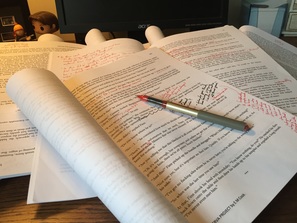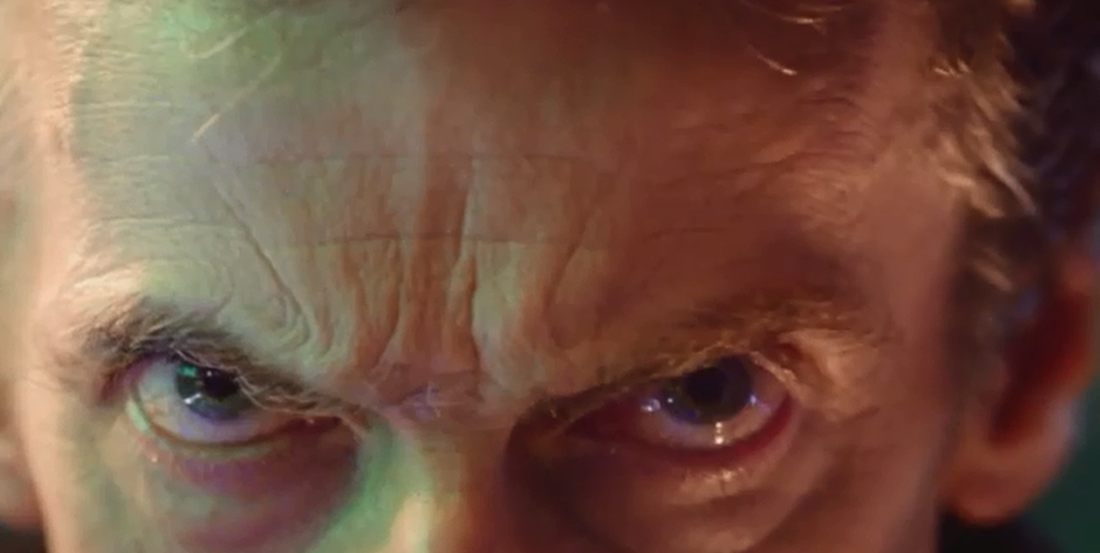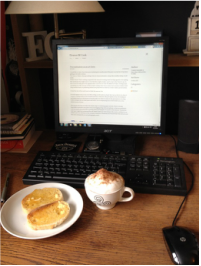
I wrote The Minerva Project during the Spring of 2014. I was pretty strict with myself: gave myself a writing schedule and a daily word target. It took me three months.
Having finished the first draft, every piece of advice from writers was the same – leave it alone for a few months.
I tried; I tried really hard, but leaving my baby alone, my creation that I had lovingly brought into this world was, I found, impossible and so I started adding bits here, changing bits there, altering names, and generally titivating until I felt I could do no more.
In the Autumn I went back to it and was amazed at how I could have thought that I had completed the editing process and so I went at it again. This time, cutting whole chunks became easier – I no longer felt the pain of deleting a paragraph or page or sometimes several pages over which I had sweated blood just a few months earlier.
It was then that I started querying agents. I also asked a select few family and friends to read it; the feedback was underwhelming to say the least. Primarily I was too close to the story to be able to view my work objectively. As anyone who has ever created a piece of art will know, the decision to share that work is a decision to share a part of one’s soul. Any criticism at this point was, in my mind, personal and hard to take.
As the responses from agents asking for full manuscripts failed to come flooding in, I became disheartened. Nobody, it seemed, understood my world I had made, nobody loved the characters like I did.
I was a failure.
It was not until this point that I adhered to the advice I had been given at the start – leave it alone.
I started writing the second book in the series, I began blogging (a bit) and expanding my internet profile. I did my research about the market and looked at the alternatives to traditional publishing.
Two years on, Spring 2016, I read The Minerva Project.
My initial impression was what I had known all along; it was a great story with some well-developed characters, but definitely not polished to publishing quality.
Heartened by the enjoyment I gained from reading my book, I attacked it without mercy: characters went, geography was altered and chapters were slashed. My husband read it and, reassured that whatever he said about it I would not immediately file for divorce, he gave me honest feedback about what did and did not work.
Several wine-fuelled nights of rehashing the story later, I edited it again to the point that I feel genuinely proud of my work.
Now the submission process needs to start allover again, although I have, obviously, reduced the number of agents I can send it to, having queried so many in my haste to see my work published.
This was a lesson I learned the hard way, but The Minerva Project is much the better for it.
I wonder what I ‘ll think of it in 2018!
Having finished the first draft, every piece of advice from writers was the same – leave it alone for a few months.
I tried; I tried really hard, but leaving my baby alone, my creation that I had lovingly brought into this world was, I found, impossible and so I started adding bits here, changing bits there, altering names, and generally titivating until I felt I could do no more.
In the Autumn I went back to it and was amazed at how I could have thought that I had completed the editing process and so I went at it again. This time, cutting whole chunks became easier – I no longer felt the pain of deleting a paragraph or page or sometimes several pages over which I had sweated blood just a few months earlier.
It was then that I started querying agents. I also asked a select few family and friends to read it; the feedback was underwhelming to say the least. Primarily I was too close to the story to be able to view my work objectively. As anyone who has ever created a piece of art will know, the decision to share that work is a decision to share a part of one’s soul. Any criticism at this point was, in my mind, personal and hard to take.
As the responses from agents asking for full manuscripts failed to come flooding in, I became disheartened. Nobody, it seemed, understood my world I had made, nobody loved the characters like I did.
I was a failure.
It was not until this point that I adhered to the advice I had been given at the start – leave it alone.
I started writing the second book in the series, I began blogging (a bit) and expanding my internet profile. I did my research about the market and looked at the alternatives to traditional publishing.
Two years on, Spring 2016, I read The Minerva Project.
My initial impression was what I had known all along; it was a great story with some well-developed characters, but definitely not polished to publishing quality.
Heartened by the enjoyment I gained from reading my book, I attacked it without mercy: characters went, geography was altered and chapters were slashed. My husband read it and, reassured that whatever he said about it I would not immediately file for divorce, he gave me honest feedback about what did and did not work.
Several wine-fuelled nights of rehashing the story later, I edited it again to the point that I feel genuinely proud of my work.
Now the submission process needs to start allover again, although I have, obviously, reduced the number of agents I can send it to, having queried so many in my haste to see my work published.
This was a lesson I learned the hard way, but The Minerva Project is much the better for it.
I wonder what I ‘ll think of it in 2018!







 RSS Feed
RSS Feed
